MBS 518 Case Study: Park Entry, Contract Law, and Third-Party Claims
VerifiedAdded on 2022/12/01
|8
|1830
|170
Case Study
AI Summary
This document is a case study analysis addressing two distinct legal scenarios. The first case examines whether a park ranger is entitled to restrict a person's entry to the park with a bicycle, analyzing the application of literal, golden, and mischief rules of statutory interpretation. The second case explores issues of contract law, specifically focusing on express and implied terms, and the potential for a third-party claim related to lost belongings on a train. The analysis considers the enforceability of contract terms, the responsibilities of parties, and the impact of missing or unclear contractual provisions, providing conclusions for each issue raised in both cases. References to legal precedents and relevant principles support the arguments presented in this case study.
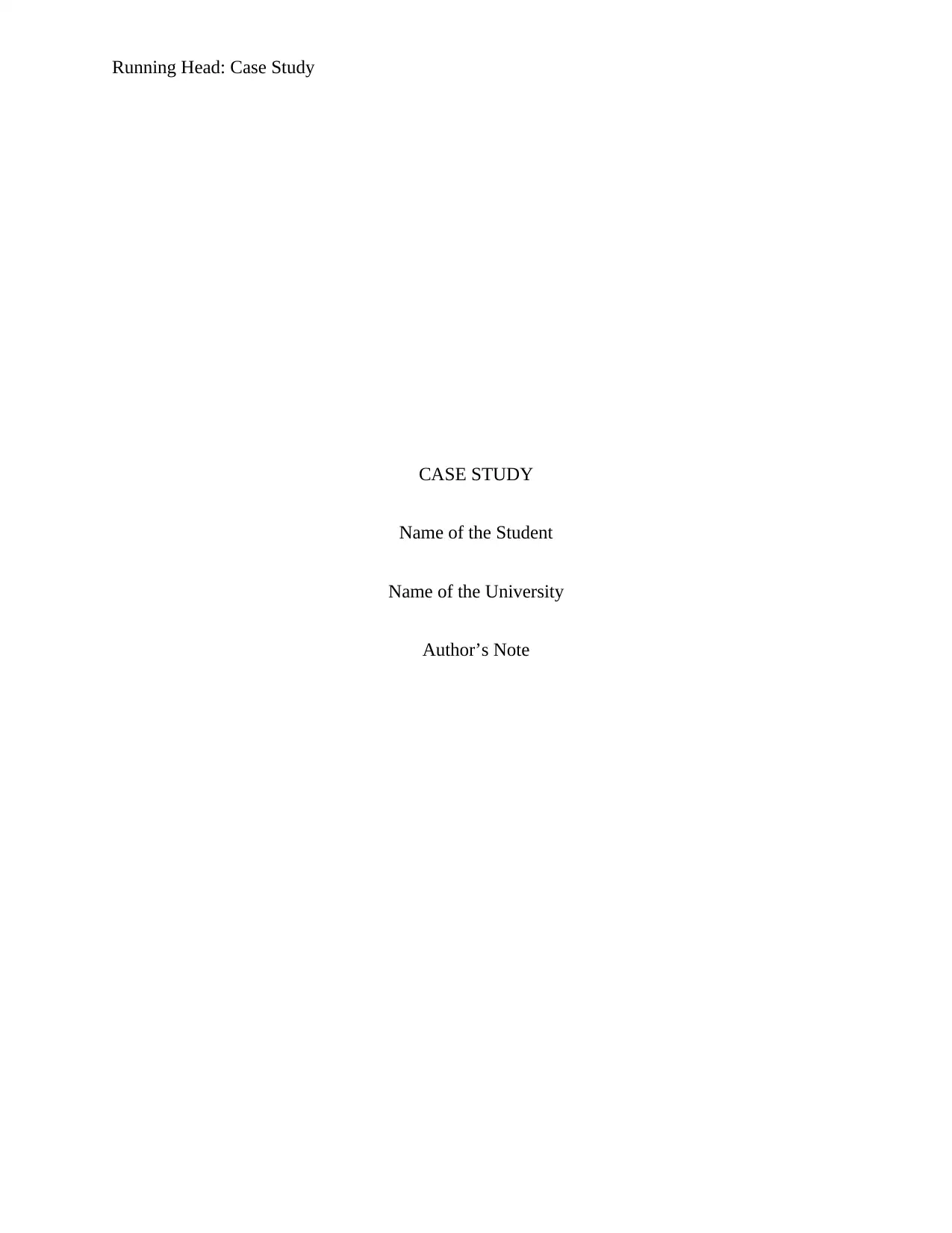
Running Head: Case Study
CASE STUDY
Name of the Student
Name of the University
Author’s Note
CASE STUDY
Name of the Student
Name of the University
Author’s Note
Paraphrase This Document
Need a fresh take? Get an instant paraphrase of this document with our AI Paraphraser
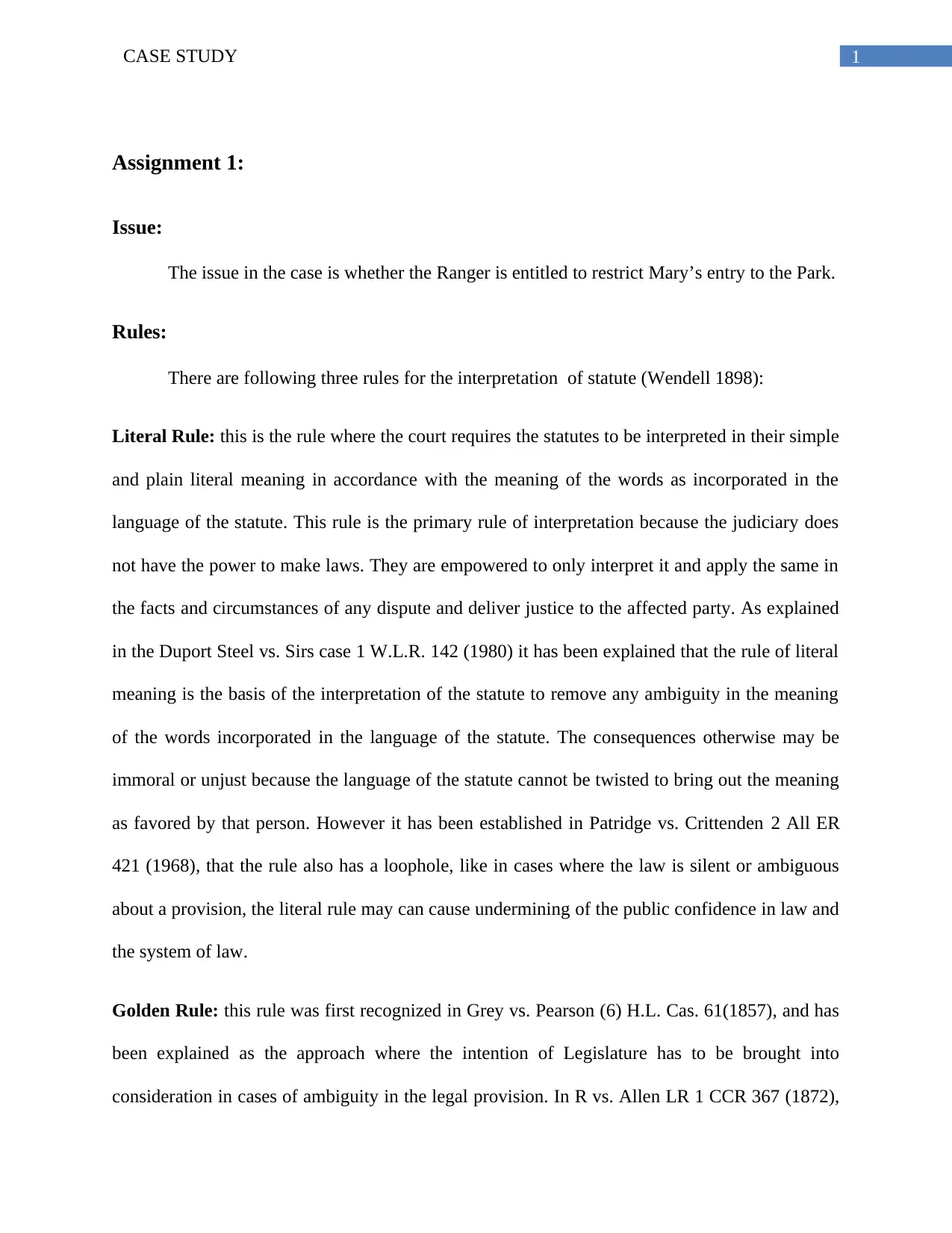
1CASE STUDY
Assignment 1:
Issue:
The issue in the case is whether the Ranger is entitled to restrict Mary’s entry to the Park.
Rules:
There are following three rules for the interpretation of statute (Wendell 1898):
Literal Rule: this is the rule where the court requires the statutes to be interpreted in their simple
and plain literal meaning in accordance with the meaning of the words as incorporated in the
language of the statute. This rule is the primary rule of interpretation because the judiciary does
not have the power to make laws. They are empowered to only interpret it and apply the same in
the facts and circumstances of any dispute and deliver justice to the affected party. As explained
in the Duport Steel vs. Sirs case 1 W.L.R. 142 (1980) it has been explained that the rule of literal
meaning is the basis of the interpretation of the statute to remove any ambiguity in the meaning
of the words incorporated in the language of the statute. The consequences otherwise may be
immoral or unjust because the language of the statute cannot be twisted to bring out the meaning
as favored by that person. However it has been established in Patridge vs. Crittenden 2 All ER
421 (1968), that the rule also has a loophole, like in cases where the law is silent or ambiguous
about a provision, the literal rule may can cause undermining of the public confidence in law and
the system of law.
Golden Rule: this rule was first recognized in Grey vs. Pearson (6) H.L. Cas. 61(1857), and has
been explained as the approach where the intention of Legislature has to be brought into
consideration in cases of ambiguity in the legal provision. In R vs. Allen LR 1 CCR 367 (1872),
Assignment 1:
Issue:
The issue in the case is whether the Ranger is entitled to restrict Mary’s entry to the Park.
Rules:
There are following three rules for the interpretation of statute (Wendell 1898):
Literal Rule: this is the rule where the court requires the statutes to be interpreted in their simple
and plain literal meaning in accordance with the meaning of the words as incorporated in the
language of the statute. This rule is the primary rule of interpretation because the judiciary does
not have the power to make laws. They are empowered to only interpret it and apply the same in
the facts and circumstances of any dispute and deliver justice to the affected party. As explained
in the Duport Steel vs. Sirs case 1 W.L.R. 142 (1980) it has been explained that the rule of literal
meaning is the basis of the interpretation of the statute to remove any ambiguity in the meaning
of the words incorporated in the language of the statute. The consequences otherwise may be
immoral or unjust because the language of the statute cannot be twisted to bring out the meaning
as favored by that person. However it has been established in Patridge vs. Crittenden 2 All ER
421 (1968), that the rule also has a loophole, like in cases where the law is silent or ambiguous
about a provision, the literal rule may can cause undermining of the public confidence in law and
the system of law.
Golden Rule: this rule was first recognized in Grey vs. Pearson (6) H.L. Cas. 61(1857), and has
been explained as the approach where the intention of Legislature has to be brought into
consideration in cases of ambiguity in the legal provision. In R vs. Allen LR 1 CCR 367 (1872),
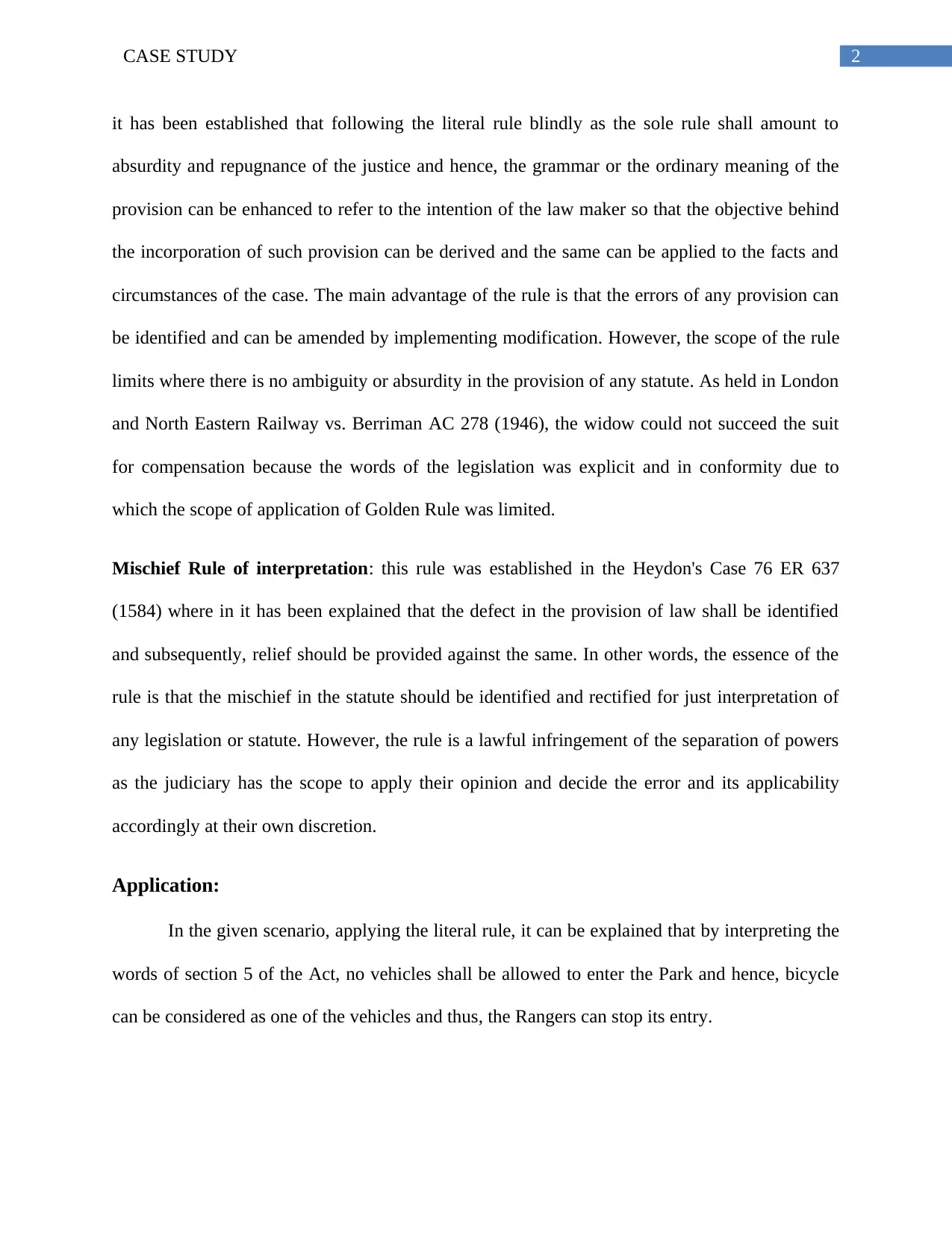
2CASE STUDY
it has been established that following the literal rule blindly as the sole rule shall amount to
absurdity and repugnance of the justice and hence, the grammar or the ordinary meaning of the
provision can be enhanced to refer to the intention of the law maker so that the objective behind
the incorporation of such provision can be derived and the same can be applied to the facts and
circumstances of the case. The main advantage of the rule is that the errors of any provision can
be identified and can be amended by implementing modification. However, the scope of the rule
limits where there is no ambiguity or absurdity in the provision of any statute. As held in London
and North Eastern Railway vs. Berriman AC 278 (1946), the widow could not succeed the suit
for compensation because the words of the legislation was explicit and in conformity due to
which the scope of application of Golden Rule was limited.
Mischief Rule of interpretation: this rule was established in the Heydon's Case 76 ER 637
(1584) where in it has been explained that the defect in the provision of law shall be identified
and subsequently, relief should be provided against the same. In other words, the essence of the
rule is that the mischief in the statute should be identified and rectified for just interpretation of
any legislation or statute. However, the rule is a lawful infringement of the separation of powers
as the judiciary has the scope to apply their opinion and decide the error and its applicability
accordingly at their own discretion.
Application:
In the given scenario, applying the literal rule, it can be explained that by interpreting the
words of section 5 of the Act, no vehicles shall be allowed to enter the Park and hence, bicycle
can be considered as one of the vehicles and thus, the Rangers can stop its entry.
it has been established that following the literal rule blindly as the sole rule shall amount to
absurdity and repugnance of the justice and hence, the grammar or the ordinary meaning of the
provision can be enhanced to refer to the intention of the law maker so that the objective behind
the incorporation of such provision can be derived and the same can be applied to the facts and
circumstances of the case. The main advantage of the rule is that the errors of any provision can
be identified and can be amended by implementing modification. However, the scope of the rule
limits where there is no ambiguity or absurdity in the provision of any statute. As held in London
and North Eastern Railway vs. Berriman AC 278 (1946), the widow could not succeed the suit
for compensation because the words of the legislation was explicit and in conformity due to
which the scope of application of Golden Rule was limited.
Mischief Rule of interpretation: this rule was established in the Heydon's Case 76 ER 637
(1584) where in it has been explained that the defect in the provision of law shall be identified
and subsequently, relief should be provided against the same. In other words, the essence of the
rule is that the mischief in the statute should be identified and rectified for just interpretation of
any legislation or statute. However, the rule is a lawful infringement of the separation of powers
as the judiciary has the scope to apply their opinion and decide the error and its applicability
accordingly at their own discretion.
Application:
In the given scenario, applying the literal rule, it can be explained that by interpreting the
words of section 5 of the Act, no vehicles shall be allowed to enter the Park and hence, bicycle
can be considered as one of the vehicles and thus, the Rangers can stop its entry.
⊘ This is a preview!⊘
Do you want full access?
Subscribe today to unlock all pages.

Trusted by 1+ million students worldwide
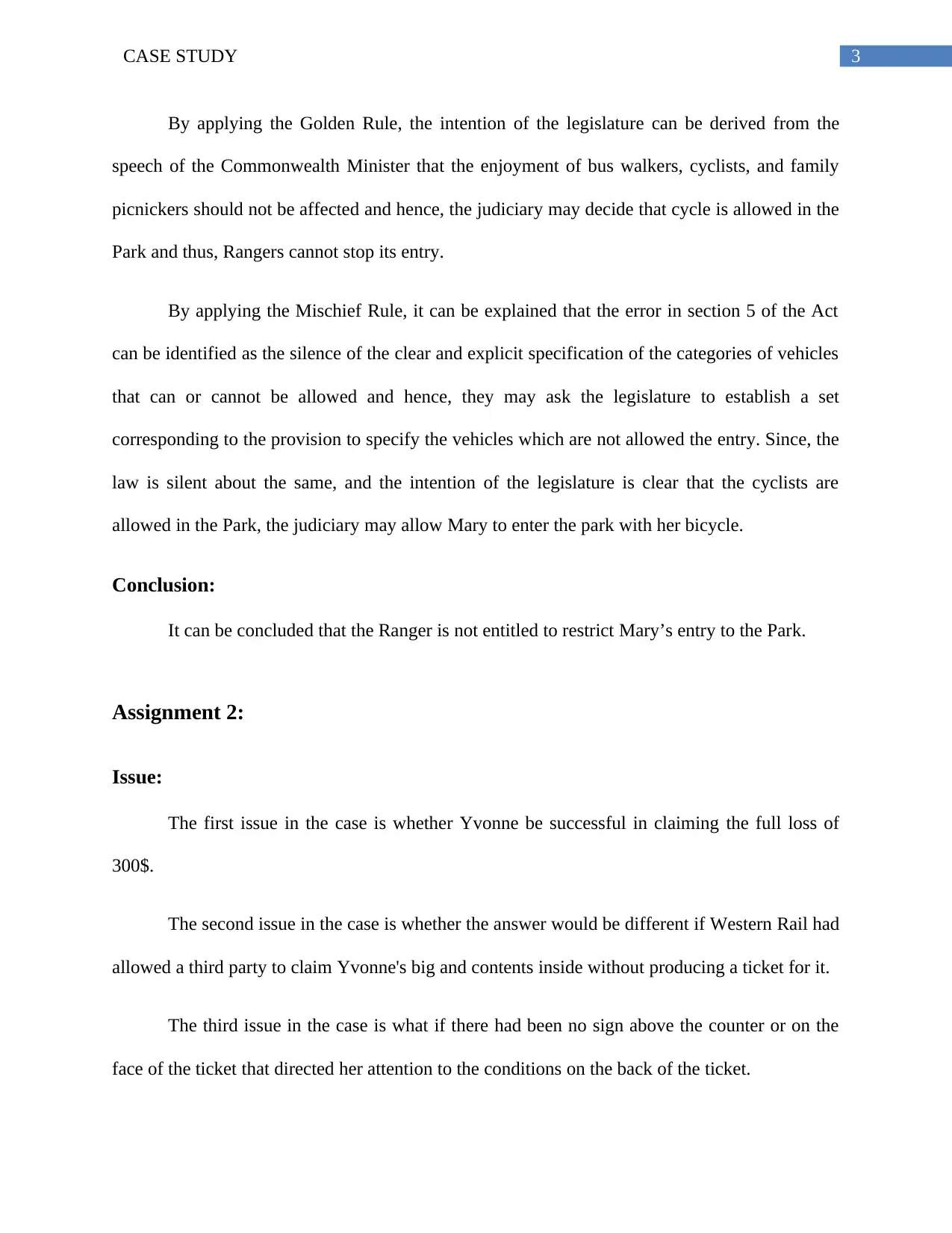
3CASE STUDY
By applying the Golden Rule, the intention of the legislature can be derived from the
speech of the Commonwealth Minister that the enjoyment of bus walkers, cyclists, and family
picnickers should not be affected and hence, the judiciary may decide that cycle is allowed in the
Park and thus, Rangers cannot stop its entry.
By applying the Mischief Rule, it can be explained that the error in section 5 of the Act
can be identified as the silence of the clear and explicit specification of the categories of vehicles
that can or cannot be allowed and hence, they may ask the legislature to establish a set
corresponding to the provision to specify the vehicles which are not allowed the entry. Since, the
law is silent about the same, and the intention of the legislature is clear that the cyclists are
allowed in the Park, the judiciary may allow Mary to enter the park with her bicycle.
Conclusion:
It can be concluded that the Ranger is not entitled to restrict Mary’s entry to the Park.
Assignment 2:
Issue:
The first issue in the case is whether Yvonne be successful in claiming the full loss of
300$.
The second issue in the case is whether the answer would be different if Western Rail had
allowed a third party to claim Yvonne's big and contents inside without producing a ticket for it.
The third issue in the case is what if there had been no sign above the counter or on the
face of the ticket that directed her attention to the conditions on the back of the ticket.
By applying the Golden Rule, the intention of the legislature can be derived from the
speech of the Commonwealth Minister that the enjoyment of bus walkers, cyclists, and family
picnickers should not be affected and hence, the judiciary may decide that cycle is allowed in the
Park and thus, Rangers cannot stop its entry.
By applying the Mischief Rule, it can be explained that the error in section 5 of the Act
can be identified as the silence of the clear and explicit specification of the categories of vehicles
that can or cannot be allowed and hence, they may ask the legislature to establish a set
corresponding to the provision to specify the vehicles which are not allowed the entry. Since, the
law is silent about the same, and the intention of the legislature is clear that the cyclists are
allowed in the Park, the judiciary may allow Mary to enter the park with her bicycle.
Conclusion:
It can be concluded that the Ranger is not entitled to restrict Mary’s entry to the Park.
Assignment 2:
Issue:
The first issue in the case is whether Yvonne be successful in claiming the full loss of
300$.
The second issue in the case is whether the answer would be different if Western Rail had
allowed a third party to claim Yvonne's big and contents inside without producing a ticket for it.
The third issue in the case is what if there had been no sign above the counter or on the
face of the ticket that directed her attention to the conditions on the back of the ticket.
Paraphrase This Document
Need a fresh take? Get an instant paraphrase of this document with our AI Paraphraser
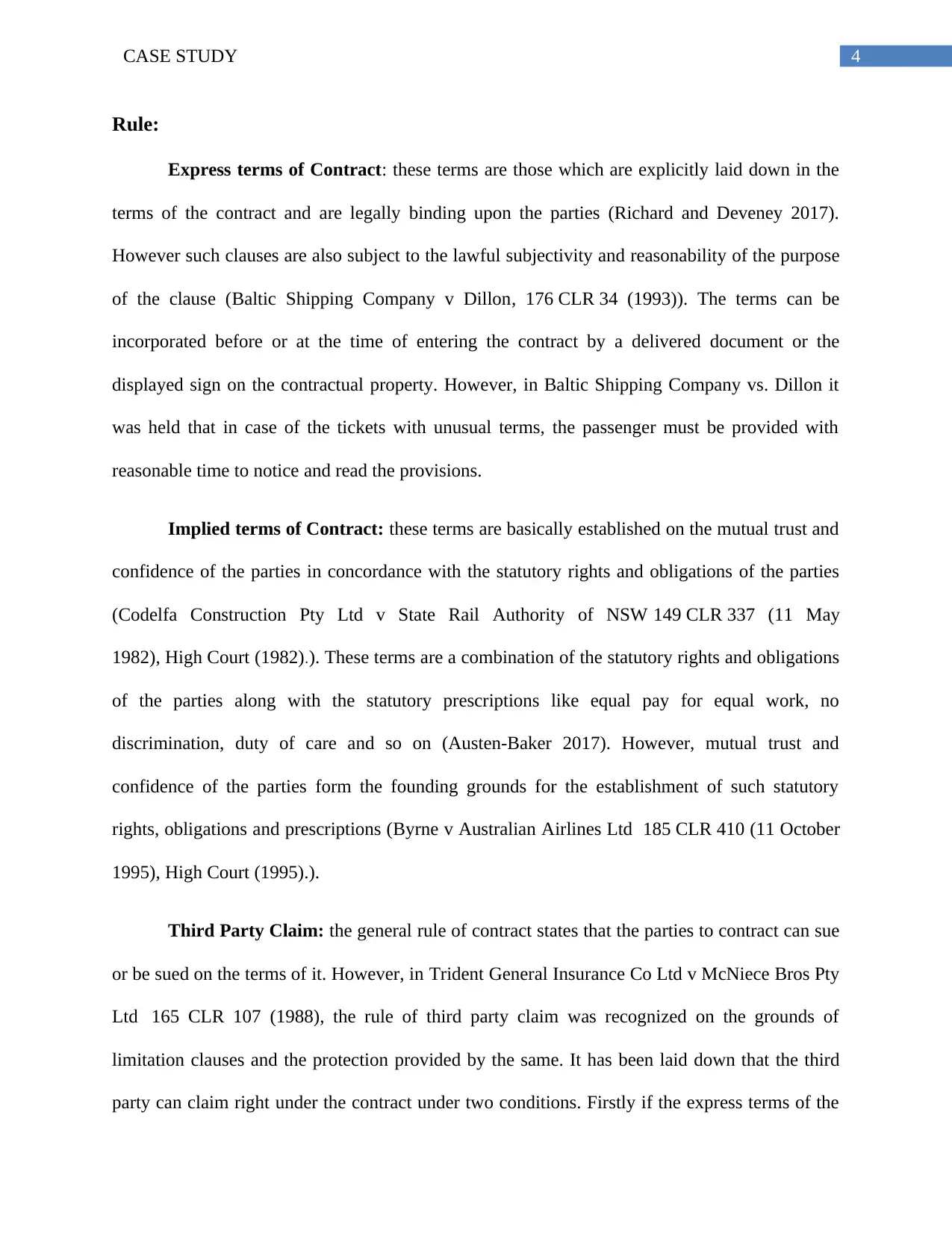
4CASE STUDY
Rule:
Express terms of Contract: these terms are those which are explicitly laid down in the
terms of the contract and are legally binding upon the parties (Richard and Deveney 2017).
However such clauses are also subject to the lawful subjectivity and reasonability of the purpose
of the clause (Baltic Shipping Company v Dillon, 176 CLR 34 (1993)). The terms can be
incorporated before or at the time of entering the contract by a delivered document or the
displayed sign on the contractual property. However, in Baltic Shipping Company vs. Dillon it
was held that in case of the tickets with unusual terms, the passenger must be provided with
reasonable time to notice and read the provisions.
Implied terms of Contract: these terms are basically established on the mutual trust and
confidence of the parties in concordance with the statutory rights and obligations of the parties
(Codelfa Construction Pty Ltd v State Rail Authority of NSW 149 CLR 337 (11 May
1982), High Court (1982).). These terms are a combination of the statutory rights and obligations
of the parties along with the statutory prescriptions like equal pay for equal work, no
discrimination, duty of care and so on (Austen-Baker 2017). However, mutual trust and
confidence of the parties form the founding grounds for the establishment of such statutory
rights, obligations and prescriptions (Byrne v Australian Airlines Ltd 185 CLR 410 (11 October
1995), High Court (1995).).
Third Party Claim: the general rule of contract states that the parties to contract can sue
or be sued on the terms of it. However, in Trident General Insurance Co Ltd v McNiece Bros Pty
Ltd 165 CLR 107 (1988), the rule of third party claim was recognized on the grounds of
limitation clauses and the protection provided by the same. It has been laid down that the third
party can claim right under the contract under two conditions. Firstly if the express terms of the
Rule:
Express terms of Contract: these terms are those which are explicitly laid down in the
terms of the contract and are legally binding upon the parties (Richard and Deveney 2017).
However such clauses are also subject to the lawful subjectivity and reasonability of the purpose
of the clause (Baltic Shipping Company v Dillon, 176 CLR 34 (1993)). The terms can be
incorporated before or at the time of entering the contract by a delivered document or the
displayed sign on the contractual property. However, in Baltic Shipping Company vs. Dillon it
was held that in case of the tickets with unusual terms, the passenger must be provided with
reasonable time to notice and read the provisions.
Implied terms of Contract: these terms are basically established on the mutual trust and
confidence of the parties in concordance with the statutory rights and obligations of the parties
(Codelfa Construction Pty Ltd v State Rail Authority of NSW 149 CLR 337 (11 May
1982), High Court (1982).). These terms are a combination of the statutory rights and obligations
of the parties along with the statutory prescriptions like equal pay for equal work, no
discrimination, duty of care and so on (Austen-Baker 2017). However, mutual trust and
confidence of the parties form the founding grounds for the establishment of such statutory
rights, obligations and prescriptions (Byrne v Australian Airlines Ltd 185 CLR 410 (11 October
1995), High Court (1995).).
Third Party Claim: the general rule of contract states that the parties to contract can sue
or be sued on the terms of it. However, in Trident General Insurance Co Ltd v McNiece Bros Pty
Ltd 165 CLR 107 (1988), the rule of third party claim was recognized on the grounds of
limitation clauses and the protection provided by the same. It has been laid down that the third
party can claim right under the contract under two conditions. Firstly if the express terms of the
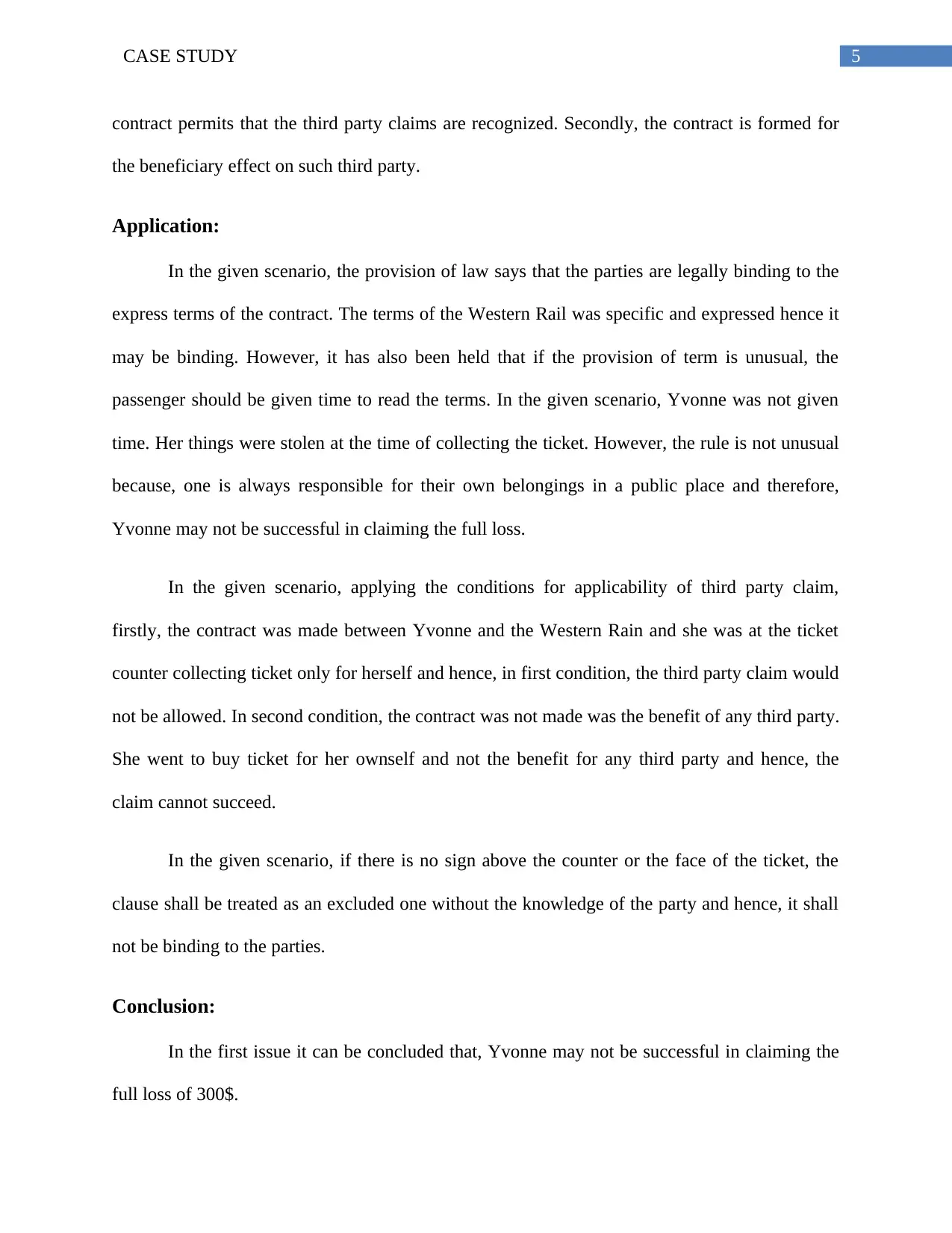
5CASE STUDY
contract permits that the third party claims are recognized. Secondly, the contract is formed for
the beneficiary effect on such third party.
Application:
In the given scenario, the provision of law says that the parties are legally binding to the
express terms of the contract. The terms of the Western Rail was specific and expressed hence it
may be binding. However, it has also been held that if the provision of term is unusual, the
passenger should be given time to read the terms. In the given scenario, Yvonne was not given
time. Her things were stolen at the time of collecting the ticket. However, the rule is not unusual
because, one is always responsible for their own belongings in a public place and therefore,
Yvonne may not be successful in claiming the full loss.
In the given scenario, applying the conditions for applicability of third party claim,
firstly, the contract was made between Yvonne and the Western Rain and she was at the ticket
counter collecting ticket only for herself and hence, in first condition, the third party claim would
not be allowed. In second condition, the contract was not made was the benefit of any third party.
She went to buy ticket for her ownself and not the benefit for any third party and hence, the
claim cannot succeed.
In the given scenario, if there is no sign above the counter or the face of the ticket, the
clause shall be treated as an excluded one without the knowledge of the party and hence, it shall
not be binding to the parties.
Conclusion:
In the first issue it can be concluded that, Yvonne may not be successful in claiming the
full loss of 300$.
contract permits that the third party claims are recognized. Secondly, the contract is formed for
the beneficiary effect on such third party.
Application:
In the given scenario, the provision of law says that the parties are legally binding to the
express terms of the contract. The terms of the Western Rail was specific and expressed hence it
may be binding. However, it has also been held that if the provision of term is unusual, the
passenger should be given time to read the terms. In the given scenario, Yvonne was not given
time. Her things were stolen at the time of collecting the ticket. However, the rule is not unusual
because, one is always responsible for their own belongings in a public place and therefore,
Yvonne may not be successful in claiming the full loss.
In the given scenario, applying the conditions for applicability of third party claim,
firstly, the contract was made between Yvonne and the Western Rain and she was at the ticket
counter collecting ticket only for herself and hence, in first condition, the third party claim would
not be allowed. In second condition, the contract was not made was the benefit of any third party.
She went to buy ticket for her ownself and not the benefit for any third party and hence, the
claim cannot succeed.
In the given scenario, if there is no sign above the counter or the face of the ticket, the
clause shall be treated as an excluded one without the knowledge of the party and hence, it shall
not be binding to the parties.
Conclusion:
In the first issue it can be concluded that, Yvonne may not be successful in claiming the
full loss of 300$.
⊘ This is a preview!⊘
Do you want full access?
Subscribe today to unlock all pages.

Trusted by 1+ million students worldwide
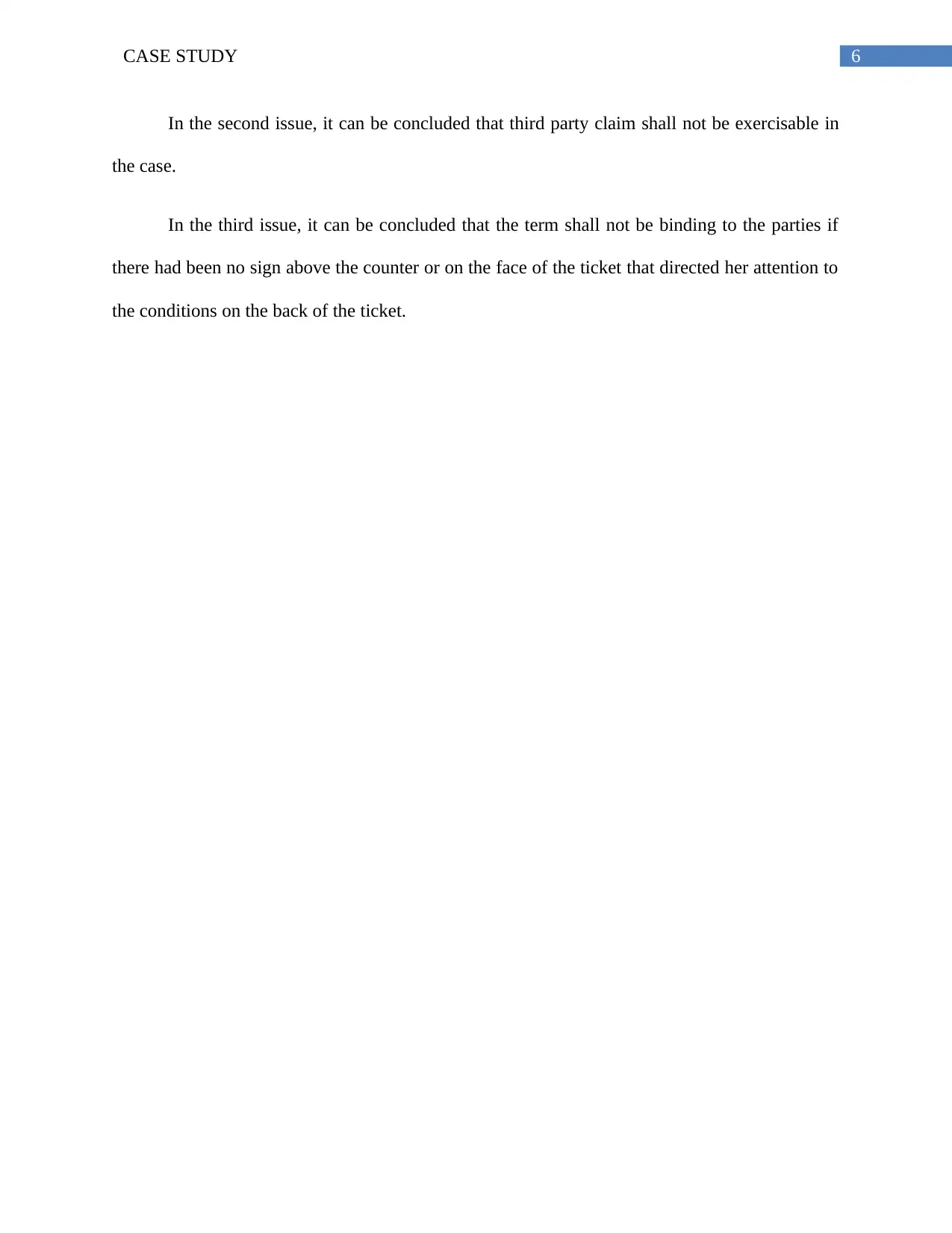
6CASE STUDY
In the second issue, it can be concluded that third party claim shall not be exercisable in
the case.
In the third issue, it can be concluded that the term shall not be binding to the parties if
there had been no sign above the counter or on the face of the ticket that directed her attention to
the conditions on the back of the ticket.
In the second issue, it can be concluded that third party claim shall not be exercisable in
the case.
In the third issue, it can be concluded that the term shall not be binding to the parties if
there had been no sign above the counter or on the face of the ticket that directed her attention to
the conditions on the back of the ticket.
Paraphrase This Document
Need a fresh take? Get an instant paraphrase of this document with our AI Paraphraser
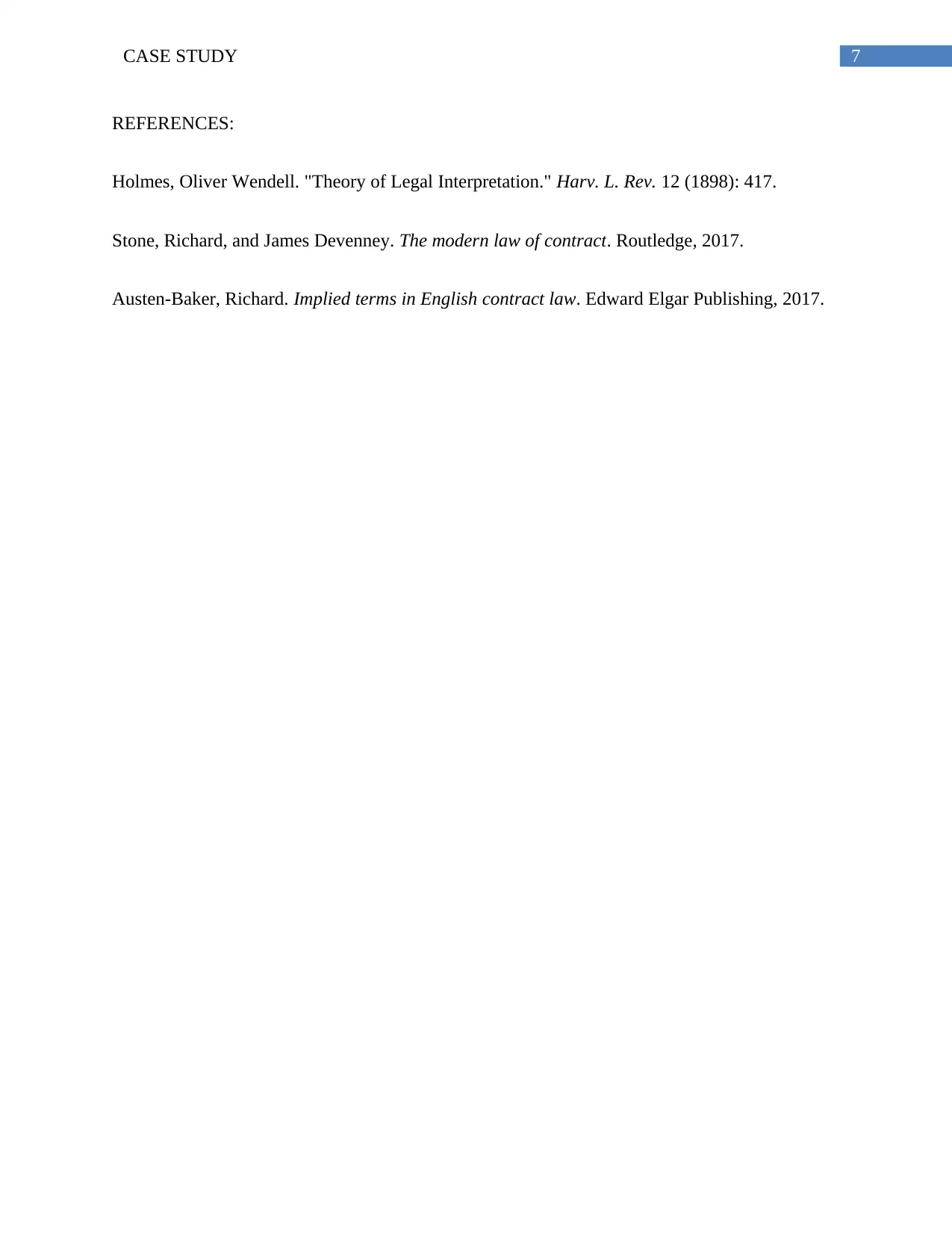
7CASE STUDY
REFERENCES:
Holmes, Oliver Wendell. "Theory of Legal Interpretation." Harv. L. Rev. 12 (1898): 417.
Stone, Richard, and James Devenney. The modern law of contract. Routledge, 2017.
Austen-Baker, Richard. Implied terms in English contract law. Edward Elgar Publishing, 2017.
REFERENCES:
Holmes, Oliver Wendell. "Theory of Legal Interpretation." Harv. L. Rev. 12 (1898): 417.
Stone, Richard, and James Devenney. The modern law of contract. Routledge, 2017.
Austen-Baker, Richard. Implied terms in English contract law. Edward Elgar Publishing, 2017.
1 out of 8
Related Documents
Your All-in-One AI-Powered Toolkit for Academic Success.
+13062052269
info@desklib.com
Available 24*7 on WhatsApp / Email
![[object Object]](/_next/static/media/star-bottom.7253800d.svg)
Unlock your academic potential
Copyright © 2020–2025 A2Z Services. All Rights Reserved. Developed and managed by ZUCOL.





